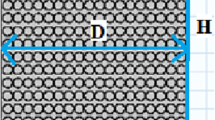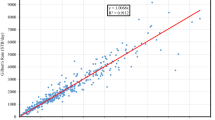Abstract
In CCS (carbon capture & storage) process, carbon dioxide is captured with impurities of various componets and different concentration. Under pipeline transporting conditions of near-critical states for CO2, the impurities such as nitrogen, methane, and hydrogen sulfide significantly affect the in-tube heat transfer coefficient and compressor power consumption, which are different from those of the pure carbon dioxide. In the present study, in-tube heat transfer coefficient and compressor power consumption of CO2 with impurities under pipeline transporting of its diameter 600 mm were predicted by using the theoretical models; the Gnielinski correlation and the Darcy- Weisbach equation. Thermal and transport properties were estimated by the Chung model and REFPROP. This prediction of the in-tube heat transfer coefficient was conducted under various parameters; CO2 mole fraction from 0.90 to 1.00 in mixture, pressure from 80 to 120 bar, temperature from -20 to 60 °C, and velocity from 1 to 4 m/s. The compressor power consumption was estimated in the pipeline of 100 km. In-tube heat transfer coefficient and compressor power consumption follows the trends of pure CO2, and were decided by the type and quantity of impurity. The maximum heat transfer coefficient of CO2 mixture decreased with increasing pressure in supercritical condition. When CO2 mole fraction was 0.95 in CO2+N2 mixture, the effect of pressure on the compressor power consumption increased after 10 °C.
Similar content being viewed by others
References
R. Yun, Thermophysical properties of CO2 and CO2-hydrate mixture and in-tube heat transfer characteristics, Korea Journal of Air-Conditioning and Refrigeration, 25 (5) (2013) 223–239.
B. Prah and R. Yun, Heat transfer and pressure drop simulation of CO2-hydrate mixture in tube, International Journal of Air-Conditioning and Refrigeration, 25 (1) (2017) 1750005.
M. I. Cho, C. Huh, J. Y. Jung, J. H. Baek and S. G. Kang, Experimental study on N2 impurity effect in the pressure drop during mixture transportation, Journal of the Korea Society for Marine Environmental Engineering, 15 (2) (2012) 67–75.
M. Nazeri, A. Chapoy, A. Valtz, C. Coquelet and B. Tohidi, Densities and derived thermophysical properties of the 0.9505CO2+0.0495H2S mixture from 273 K to 353 K and pressure up to 41 MPa, Fluid Phase Equilibria, 423 (15) (2016) 156–171.
C. Dang and E. Hihara, In-tube cooling heat transfer of supercritical carbon dioxide. Part 1. Experimental measurement, International Journal of Refrigeration, 27 (7) (2004) 736–747.
C. H. Son, D. G. Lee, H. K. Oh, S. Y. Jeong and Y. L. Kim, Heat transfer characteristics during gas cooling process of carbon dioxide in a horizontal tube, Transactions of the KSME B, 28 (3) (2004) 289–295.
Y. Tan, W. Nookuea, H. Li, E. Thorin, L. Zhao and J. Yan, Property impacts on performance of CO2 pipeline transport, Energy Procedia, 75 (2015) 2261–2267.
H. Li, Ø. Wilhelmsen, Y. Lv, W. Wang and J. Yan, Viscosities, thermal conductivities and diffusion coefficients of CO2 mixtures: review of experimental data and theoretical models, International Journal of Greenhouse Gas Control, 5 (2011) 1119–1139.
A. Austegard, J. Stang and G. Skaugen, D 1.2.8 investigation of models for prediction of transport properties, Report of Project IMAPCTS (2014).
L. Chen and X. R. Zhang, Heat transfer and various convection structures of near-critical CO2 flow in microchannels, Applied Thermal Engineering, 72 (1) (2013) 135–142.
Y. Tan, W. Nookuea, H. Li, E. Thorin, L. Zhao and J. Yan, Property impacts on performance of CO2 pipeline transport, Energy Procedia, 75 (2015) 2261–2267.
M. Mazzoccoli, G. D. Guido, B. Bosio, E. Arato and L. A. Pellegrini, CO2-mixture properties for pipeline transportation in the CCS process, Chemical Engineering Transactions, 32 (2013) 1861–1866.
W. Lee and R. Yun, Prediction of transport properties for transportation of captured CO2. 1. Viscosity, Korea Journal of Air-Conditioning and Refrigeration Engineering, 29 (4) (2017) 195–201.
W. Lee and R. Yun, Prediction of transport properties for transporting captured CO2. 2. Thermal conductivity, Korea Journal of Air-Conditioning and Refrigeration Engineering, 29 (5) (2017) 213–219.
B. E. Poling, J. M. Prausnitz and J. P. O’connell, The properties of gases and liquids, 5th Edition, McGraw-Hill (2004).
E. W. Lemmon, M. L. Huber and M. O. Mclinden, Reference fluid thermodynamic and transport properties (REFPROP) Version 9.1 user's guide, National Institute of Standards and Technology (2013).
P. N. Seevam, J. M. Race, M. J. Downie and P. Hopkins, Transporting the next generation of CO2 for carbon, capture and storage: the impact of impurities on supercritical CO2 pipelines, 7th International Pipeline Conference, 1 (2008) 39–51.
M. Mohitpour, P. Seevam, K. K. Botros, B. Rothwell and C. Ennis, Pipeline transportation of carbon dioxide containing impurities, ASME, New York, USA (2012).
Z. Wang, Effects of impurities on CO2 geological storage, Master Thesis, University of Ottawa, Canada (2015).
W. Lee and Y. Rin, Heat transfer characteristics of supercritical carbon dioxide which contains the impurity, Journal of Winter Conference on SAREK (2017) 21–24.
Author information
Authors and Affiliations
Corresponding author
Additional information
Recommended by Associate Editor Chang Yong Park
Rin Yun is a Professor of Department of Mechanical Engineering, Hanbat National University, Daejeon, South Korea. His research interests are utilizing natural refrigerants, transportation of Captured CO2, and gas-hydrate as a secondary fluid.
Rights and permissions
About this article
Cite this article
Lee, W., Yun, R. Prediction of heat transfer coefficient and compressor power consumption for CO2 with impurities under pipeline transporting condition. J Mech Sci Technol 32, 2339–2346 (2018). https://doi.org/10.1007/s12206-018-0445-9
Received:
Revised:
Accepted:
Published:
Issue Date:
DOI: https://doi.org/10.1007/s12206-018-0445-9




